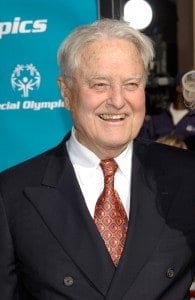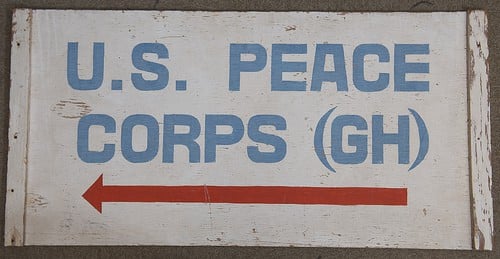
Sargent Shriver
Image: Featureflash / Shutterstock
Fifty-three years ago today, on March 1, 1961, President John F. Kennedy created the Peace Corps when he signed a simple, two page executive order, and through what emerged he may have revealed a saint among us.
Almost a quarter million Peace Corps Volunteers have served in 139 countries since 1961, making differences – sometimes small, sometimes large – in the lives of people in developing countries, but most of all coming back as changed people and citizens of the world. I certainly came back from my own Peace Corps service a changed person. I went to Malawi in 2001 with fantastical ideas about life in the bush and the revolutionary difference I would make, but I came to realize very soon that my Discovery Channel impressions of Africa were far from reality, and the real riches of that place lay in her people.1
And it was in Malawi that I first heard the stirrings of a new vocation, where I realized that I would only be most deeply satisfied with a life that was spent in dedicated service to others, especially the poor. A few years after I left the Peace Corps I entered the Jesuits, because I made a choice to follow that voice to its unexpected results, something I’m still doing today.
The founding director of Peace Corps and the person largely responsible for creating these life-changing possibilities was Sargent Shriver, the president’s brother-in-law. Shriver was a man deeply rooted in his Catholicism, and his faith – especially a commitment to social justice – motivated not only his involvement in the early years in the Peace Corps, but all of his commitments in life.
Writing in America Magazine last November on the Feast of All Saints, John Carr said this about Shriver’s holiness:
In January of 2011, Sargent Shriver died after a long and good life of extraordinary service, courage and faith. I believe he was a saint in our midst and the church should consider whether he should be formally declared a saint because of the virtues and holiness he demonstrated in his public and private life. Sargent Shriver was not a monk or hermit, not a mystic or cleric. He was a husband and father, a public servant and friend of the poor, a devout Catholic and a man of secular power. In the words of his son Mark’s wonderful book, Sarge Shriver was “a good man” and a great model for the rest of us.
But Shriver’s deeply rooted faith might be most evident in an address written for Georgetown University and published in America Magazine in 1964, where he implored students and faculty to dedicate themselves to serving the poor. It’s worth reading the whole thing, but here’s an excerpt:
In our great sacraments, we see the love of God for man.
Because His word became flesh, we vow to try to make the word become flesh in our own inadequate lives. There is another “sacrament” that can help us learn how to do this, a “sacrament” that can give us the strength to keep on trying to do it. It is the “Sacrament of Service to Man-in-Need.”
Christ considered this so important that He made our final judgment turn, not on the number of prayers we say, but on whether or not we are too busy to help Him when He comes to us in the garments of the poor. “I was hungry, and you gave me to eat: I was thirsty, and you gave me to drink: I was a stranger, and you took me in … as long as you did it to one of these my least brethren, you did it to me.”
So it is time, as it has always been time, for us to lower our shields, and to see the sacrament awaiting us beyond the altar rail, outside the campus gates. It is this mission to which we are sent, when we leave the chapel that stands at the heart of this campus. “lte missa est” does not mean our trivial translation, “It is finished, you can go.” It means, instead, “Go and fulfill your mission.”
******
Cover image via Flickr user National Museum of American History Smithsonian Institution, found here.
- I know I’m biased, but I still believe that Malawians are among the warmest people I have ever encountered, and they are the reason Malawi is called the Warm Heart of Africa. ↩


